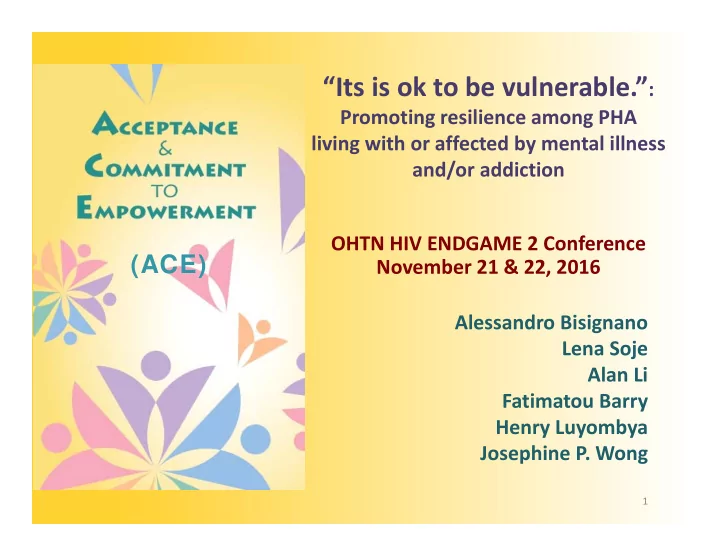

“Its is ok to be vulnerable.” : Promoting resilience among PHA living with or affected by mental illness and/or addiction OHTN HIV ENDGAME 2 Conference (ACE) November 21 & 22, 2016 Alessandro Bisignano Lena Soje Alan Li Fatimatou Barry Henry Luyombya Josephine P. Wong 1
Committee for Accessible AIDS Treatment • Formed in 1999 to reduce barriers faced by people living with HIV/AIDS (PHAs) who are immigrants, refugees or without status in Canada • Coalition of over 40 health, legal and social service organizations plus individual http://www.hivimmigration.ca immigrant/refugee PHAs • Community Education, Research, Service coordination and Advocacy on issues related to HIV, immigration and access 2
Why the ACE Program Needs identified at frontline Consultation Program & with CAAT service gaps members & in community PHA ACE 3
From CHAMP to ACE: Addressing Multi‐layered Stigma & Promoting Resilience PHA EMPOWER‐ MENT Asian MH Summit 2016 4
A A A B cceptance cceptance & ommitment mmitment to to mpowerment mpowerment C E • PHA -driven & PHA -centered • uild on insights CHAMP • pply (cceptance & ommitment raining) ACT A C T • pply (ocial ustice CAT SJCE S J & ollective mpowerment trategies). C E S ... ... A C E PHA Workgroup CAAT Mentors CAAT‐Legacy Program 5
Acceptance & Commitment to Empowerment (ACE): A 10‐session personal and collective empowerment program for PHA experiencing challenges related to traumas, stress, loss, and addiction issues. Objectives: ACE • Promote Psychological Flexibility • Reduce stigma associated with addiction and/or mental health challenges • Increase self‐compassion and self‐care • Consolidate mutual support and advocacy • Build capacity for peer and collective empowerment 6
Acceptance & Commitment to Empowerment (ACE) • An integrated model of ACT and SJCE with foci on: – Mindfulness practice – Self acceptance and self compassion – Nonviolent /Compassionate communication – Self‐care strategies – Critical dialogue on identities – Critical dialogue on social and structural influences on body‐mind‐spirit – Collective compassionate peer support and committed action 7
ACE: First cohort Total of 10 participants Evaluation Methods • Session feedback forms • Pre‐ and post training surveys • Post‐training focus group 8
Session Evaluation Results What participants What matters to How they will apply learned participants ACE strategies 1 Self‐awareness; self‐ Safety (closed group); Get to know self; care; mindfulness feeling “not alone” & share with friends, “hope” practice mindfulness 2 Mindful eating; self & Share experiences & Let go of labels; love social identities; how compassion; connect myself more; being to let go with values mindful in everything 3 memories as the Acceptance: I still have How to deal with observed past, not issues and that is okay; emotions and ask for who we are; aware of being non‐judgmental of support; staying in the thoughts as thoughts self moment 4 Gratitude exercise; Sharing & acceptance; As inner healing; to loving kindness mutual appreciation build skill in not being meditation a people pleaser 5 Non‐violent Awareness of It is okay to be communication fundamental human vulnerable; practice (NVC) needs; non‐judgemental NVC with children 9
Reflection and Insights • Awareness that pain does not have to become suffering • Mindfulness and self compassion reduce the effects of emotional triggers; more self‐confidence • Opening up – courage to be vulnerable • Safe space and trust enable honest sharing and genuine mutual support • Experiential activities promote body‐mind‐spirit integration • Dialogue on structural determinants of health reduce stigma and self‐blame • Practical tools support practices of self‐care and self‐ compassion promote mental health and prevent relapse • Value matters ‐‐ in promoting and supporting committed action 10
Letting Go, Getting Unhooked I am open. I believe I believe beyond the self… I am beautiful I am wanted. & wonderful. I deserve I deserve the best! the best! Soul Food: Compassion Social Justice Fairness 11
ACE: Not Only for Individual Resilience • ACE Cohort One graduates are now co‐facilitating Cohort Two training • Many applied ACE strategies at work and among family and friends Collective Resilience Individual Resilience 12
Acknowledgements • ACE Planning Committee • ACE members • ACE Coordinator: Alessandro Bisignano • ACE Facilitator & Author: Josephine P. Wong • CHAMP Designers & Co‐authors: Alan T. W. Li; Kenneth P. L. Fung; Josephine P. Wong • CAAT Director: Maureen Owino ACE is a group mentorship component of the Legacy Program, Committee for Accessible AIDS Treatment 13
Recommend
More recommend